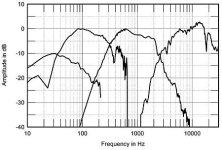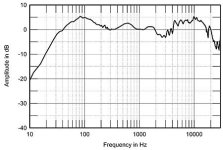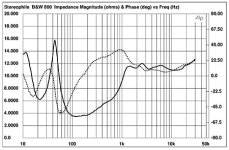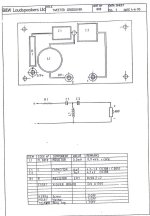Hi, everyone!
I am planning to replace the tweeters of my B&W Matrix 800 speakers.
I always felt that the speakers exhibit rather harsh treble particularly
with violin music. I have tried to resolve this by various measures such
as recapping and ferrofluid replacement. However, that didn't completely
resolve the harsh treble issue.
So I want to replace the tweeters with something more smooth
or more natural sounding. However, I don't have the technical
expertise to choose a right model. I know the model number
of the stock B&W Matrix 800 tweeter is ZZ05312 but I can't
find any technical details beyond that.
The only other thing I could do was to measure the DC resistances
of the original tweeters, which read 4.55Ohms and 4.75Ohms.
The specifications of B&W Matrix 800 is as follows:
- Impedance: 4Ohms nominal (3ohms minimum)
- Sensitivity: 93dB (for 2.83V at 1m)
- Recommended Power: 150W - 800W
- 3-Way speakers with two 12in polymer-cone woofer,
two 5in Kevlar-Cone midrange,
one 1.25in ferrofluid-cooled metal dome tweeter
- Frequency response 23Hz - 20kHz
Can anyone instruct me what specifications I have to consider
to determine the right tweeter?
Any of your comments and opinions will be appreciated.
For example,
- what nominal impedance should I choose? (6Ohm?, 8Ohm?)
- what sensitivity? (exact 93dB? or 94dB? or 95dB or higher?)
- what power handling?
- can I use any of the following?
Satori TW29TXN-B-8 [8Ohm, 6.2Ohm, 93.5dB], Satori TW29BN-B-8[8Ohm, DCR 6.2Ohm, 93.5dB],
ScanSpeak D2908/7140 [8Ohm, DCR 5.7Ohm, 92dB], Seas T29CF-002 [6Ohm, 4.7Ohm, 92.5dB],
Satori TW29BN-B [4Ohm, DCR 3.0Ohm, 95dB], and etc....
- any suggestions on possible model choices.
Thanks for reading,
< I attach some photos for your information >
I am planning to replace the tweeters of my B&W Matrix 800 speakers.
I always felt that the speakers exhibit rather harsh treble particularly
with violin music. I have tried to resolve this by various measures such
as recapping and ferrofluid replacement. However, that didn't completely
resolve the harsh treble issue.
So I want to replace the tweeters with something more smooth
or more natural sounding. However, I don't have the technical
expertise to choose a right model. I know the model number
of the stock B&W Matrix 800 tweeter is ZZ05312 but I can't
find any technical details beyond that.
The only other thing I could do was to measure the DC resistances
of the original tweeters, which read 4.55Ohms and 4.75Ohms.
The specifications of B&W Matrix 800 is as follows:
- Impedance: 4Ohms nominal (3ohms minimum)
- Sensitivity: 93dB (for 2.83V at 1m)
- Recommended Power: 150W - 800W
- 3-Way speakers with two 12in polymer-cone woofer,
two 5in Kevlar-Cone midrange,
one 1.25in ferrofluid-cooled metal dome tweeter
- Frequency response 23Hz - 20kHz
Can anyone instruct me what specifications I have to consider
to determine the right tweeter?
Any of your comments and opinions will be appreciated.
For example,
- what nominal impedance should I choose? (6Ohm?, 8Ohm?)
- what sensitivity? (exact 93dB? or 94dB? or 95dB or higher?)
- what power handling?
- can I use any of the following?
Satori TW29TXN-B-8 [8Ohm, 6.2Ohm, 93.5dB], Satori TW29BN-B-8[8Ohm, DCR 6.2Ohm, 93.5dB],
ScanSpeak D2908/7140 [8Ohm, DCR 5.7Ohm, 92dB], Seas T29CF-002 [6Ohm, 4.7Ohm, 92.5dB],
Satori TW29BN-B [4Ohm, DCR 3.0Ohm, 95dB], and etc....
- any suggestions on possible model choices.
Thanks for reading,
< I attach some photos for your information >
- FrequencyResponse(Drivers).jpg : Driver Frequency Response Measurement by Stereophile Magazine.
- FrequencyResponse(Overall).jpg : Overall Frequency Measurement by Stereophile Magazine.
- Impedance.jpg: Impedance Measurement by Stereophile Magazine.
- TweeterCrossOver.jpg : Tweeter Crossover contained in B&W Service Manual
Attachments
Are there any tweeters that fit the tweeter cutout?
Have you tried EQ to determine the frequency that is off?
Are you willing to buy a mic to measure?
Have you tried EQ to determine the frequency that is off?
Are you willing to buy a mic to measure?
Are there any tweeters that fit the tweeter cutout?
-> I can't find exact match. I think I will need some custom-made adapter ring.
Have you tried EQ to determine the frequency that is off?
-> No. I don't use EQ. By the way, if you see one of the attached frequency response measurement made by stereophile magazine, you will be able to see the frequency response. But, regardless of the loudness at a certain high frequency, the sound itself is not that pleasant.
Are you willing to buy a mic to measure?
-> Actually, I bought a mic for measurement but didn't yet use it.
-> I can't find exact match. I think I will need some custom-made adapter ring.
Have you tried EQ to determine the frequency that is off?
-> No. I don't use EQ. By the way, if you see one of the attached frequency response measurement made by stereophile magazine, you will be able to see the frequency response. But, regardless of the loudness at a certain high frequency, the sound itself is not that pleasant.
Are you willing to buy a mic to measure?
-> Actually, I bought a mic for measurement but didn't yet use it.
It can be a PITA to alter a tweeter cutout. I suspect that you might try several to see which has the sound you like. I read the review of the speaker. They say it's picky about source equipment, etc. I don't spend big bucks on drivers, but I have a few I like a lot. What I would suggest is measuring just the tweeter. That will give you a reference point to match. If you can measure the cutout for the tweeter, it may be somewhat common. For example, there's a few tweeters that are 104mm overall diameter. Sometimes there's notches in the hole for the wiring / leads. These are not too hard to alter, but if you can find a tweeter that drops in, that would be a good start. I like Morel tweeters, but there's many I have not heard.
There are x-over tweaks that could help. A notch filter is like EQ, but better. It can be tuned to specific frequencies. You could run wires out to try several frequencies with the parts outside the box. Measuring would confirm what you are changing. It might be as small as a 2dB change to get a better sound. Just looking at the response, I'd probably add a notch at 10k. The parts to do this are less expensive than a good tweeter. Everything above 4k could be brought closer to the 0dB line. It would be a gradual notch.
There are x-over tweaks that could help. A notch filter is like EQ, but better. It can be tuned to specific frequencies. You could run wires out to try several frequencies with the parts outside the box. Measuring would confirm what you are changing. It might be as small as a 2dB change to get a better sound. Just looking at the response, I'd probably add a notch at 10k. The parts to do this are less expensive than a good tweeter. Everything above 4k could be brought closer to the 0dB line. It would be a gradual notch.
Last edited:
Dear temp25,
Thanks for your suggestions.
First of all, regarding your suggestion for notch filter,
I will try. If you watch the first two attached photos,
you will notice that the gain is low between 2-4kHz
and high between 5-10kHz. I am not sure if I can
increase the gain between 2-4kHz considering
the tweeter and the midrange response shown
in the first photo. In any case, I will try some
further crossover tweak according to your suggestion.
Secondly, the cutout diameter is about 97cm (the cutout
is not exactly circular because of the path for wires).
The tweeter plate has diameter 125mm with 4 screw holes
with diameter 113.14mm. I think the size of the plate is not
that typical. As you pointed out, there are some tweeters
with overall diameter 104mm. I think I can find some local
wood-working shop to cut wood to make an appropriate
adaptor ring for such tweeters or I might use some 3D
printing services.
So fitting tweeters into the cutout is something I have to
deal with later. The first thing is to know what tweeter
specifications I have to look for.
First of all, I need to know what impedance I have to choose
for the tweeter. Should I choose 4ohm, 6ohm, or 8ohm?
Secondly, what sensitivity should I choose? Should it be 93dB
because Matrix 800 is 93dB speaker? Or should it be higher than
93dB? For example, if I buy 92dB tweeter and if the gain is too
low, there is no way to compensate the gain by tweaking crossover.
So I want to know how high the sensitivity of the tweeter should be.
I just don't know where to start in selecting the tweeters.
That's my problem.
Thanks for your suggestions.
First of all, regarding your suggestion for notch filter,
I will try. If you watch the first two attached photos,
you will notice that the gain is low between 2-4kHz
and high between 5-10kHz. I am not sure if I can
increase the gain between 2-4kHz considering
the tweeter and the midrange response shown
in the first photo. In any case, I will try some
further crossover tweak according to your suggestion.
Secondly, the cutout diameter is about 97cm (the cutout
is not exactly circular because of the path for wires).
The tweeter plate has diameter 125mm with 4 screw holes
with diameter 113.14mm. I think the size of the plate is not
that typical. As you pointed out, there are some tweeters
with overall diameter 104mm. I think I can find some local
wood-working shop to cut wood to make an appropriate
adaptor ring for such tweeters or I might use some 3D
printing services.
So fitting tweeters into the cutout is something I have to
deal with later. The first thing is to know what tweeter
specifications I have to look for.
First of all, I need to know what impedance I have to choose
for the tweeter. Should I choose 4ohm, 6ohm, or 8ohm?
Secondly, what sensitivity should I choose? Should it be 93dB
because Matrix 800 is 93dB speaker? Or should it be higher than
93dB? For example, if I buy 92dB tweeter and if the gain is too
low, there is no way to compensate the gain by tweaking crossover.
So I want to know how high the sensitivity of the tweeter should be.
I just don't know where to start in selecting the tweeters.
That's my problem.



